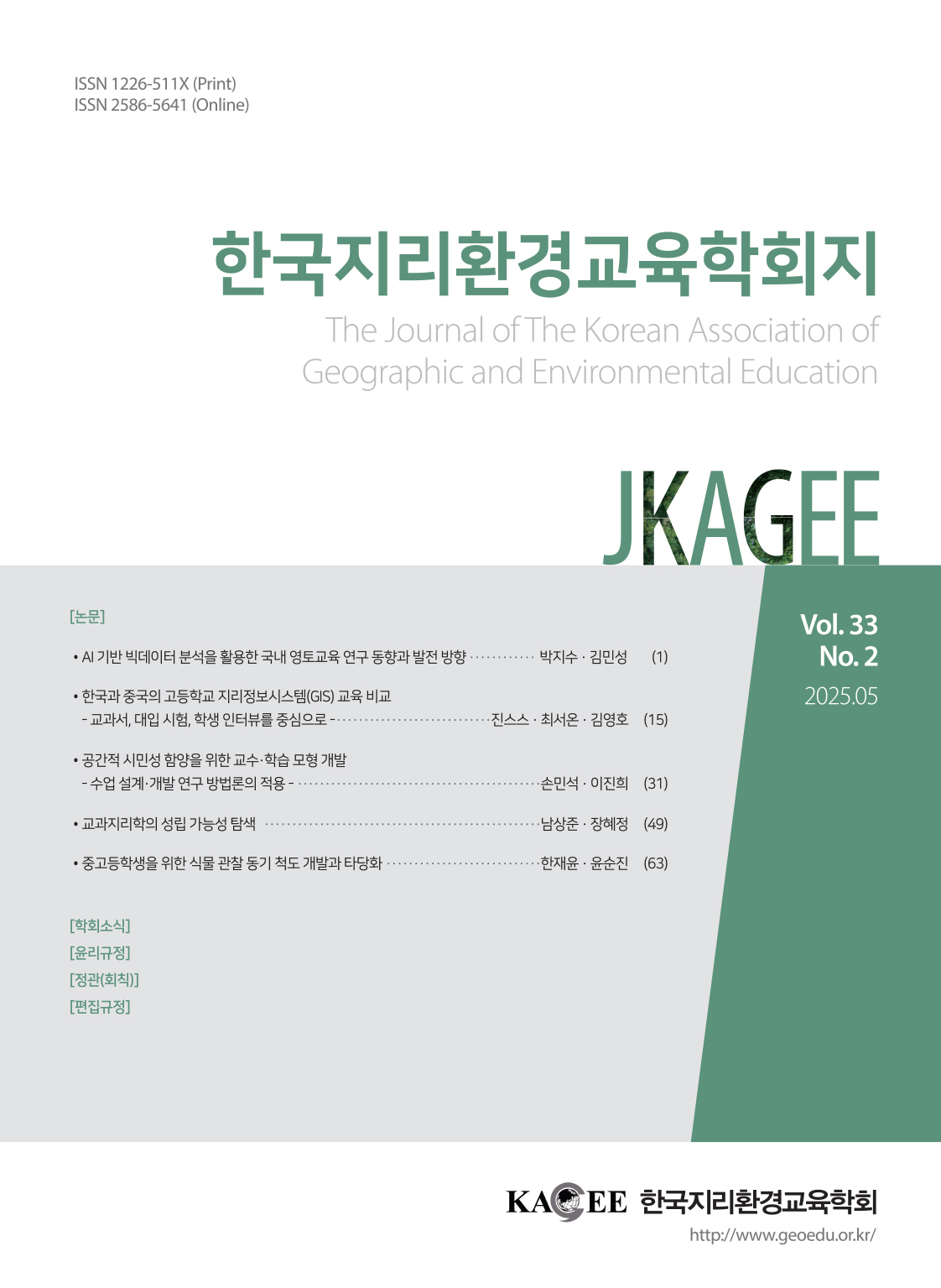Research Article
Abstract
References
Information
The purpose of this study is to suggest how geography education is responding to climate change, which has been a major environmental issue and problem in the global community, and what role it should play in the future. The climate environment contents of the elementary geography curriculum in Korea, Canada, Ontario, and Australia were analyzed. According to the analysis results, all three curriculums consisted of climate environment contents based on ‘exploration of relationship between human and climate environment’, ‘exploration of sustainability-linked climate environment’, and ‘exploration of global citizenship-linked climate environment’. However, while the curriculums in Ontario and Australia contains a lot of relevant content from the lower grades in terms of learning about the process of interaction between humans and the environment and connection with sustainabilit and global citizenship, the geography curriculum in Korea shows weaker contents composition. Sufficient deliberation and discussion are needed on how to include contents on climate change in the future curriculum, how to further strengthen the contents of “interactions between humans and the environment”, “connection with sustainability” and “connection with global citizenship”.
본 연구의 목적은 그간 기후교육의 핵심교과로 역할하고 있는 지리교육에서 오늘날 지구촌의 주요 환경이슈이자 해결과제로 나타난 기후변화에 대해 지리교육은 어떻게 대응하고 있으며 앞으로 이에 대해 지리교육은 어떤 역할을 해야 할 것인지를 제시하는 데 있다. 한국, 캐나다 온타리오주, 호주의 초등 지리교육과정의 기후내용을 분석하였다. 분석결과를 보면, 세 교육과정에서는 모두 ‘인간과 기후환경 간의 관계 탐색’, ‘지속가능성 연계 기후환경 탐색’, ‘글로벌 시민성 연계 기후환경 탐색’을 중심으로 기후환경 내용을 구성하였다. 그러나 온타리오주 및 호주 교육과정에는 인간과 환경 간의 상호작용의 과정에 대한 학습과 지속가능성, 세계시민성과의 연계 면에서 저학년에서부터 더 적극적으로 관련 내용을 많이 포함하고 있는 것과는 달리 한국의 지리교육과정에서는 소극적인 내용 구성을 보인다. 향후 교육과정에서 기후변화에 대한 교육을 어떻게 포함할 것인지 그리고 ‘인간과 환경 간의 상호작용’, ‘지속가능성과 연계’, ‘세계시민성과 연계’ 내용을 어떻게 더 강화할 것인지에 대해 충분한 숙고와 논의가 필요하다.
- 강철성, 1997, 한국의 기후구분에 관한 연구: 생리기후 지수에 의한 구분을 중심으로, 서울대학교 대학원 박사학위논문.
- 강철성, 2003, “탐구식 교수를 위한 교수기법의 사례- 기후 관련 내용을 중심으로”, 한국지리환경교육학회지, 11(3), 6-86.
- 공다영, 2009, 기후변화교육을 위한 중등학생의 기후변화 인식 실태 분석, 이화여자대학교 교육대학원 석사학위논문.
- 공우석, 2021, 기후위기 더 늦기전에 더 멀어지기 전에, 이다북스.
- 교육부, 2015, 2015개정사회과교육과정.
- 교육부, 2018, 사회 3-2.
- 교육부, 2019a, 사회 5-1.
- 교육부, 2019b, 사회 6-2.
- 김다원, 2020, “초등 2015개정교육과정에 포함된 지속가능발전교육(ESD) 관련 목표와 내용 탐색”, 국제이해교육연구, 15(1), 1-31. 10.35179/jeiu.2020.15.1.1
- 김미애・김영훈, 2020, “지리학습을 위한 수업용 어플리케이션 개발 연구: 중학교 사회1 기후 단원을 중심으로”, 융합교육연구, 6(2), 19-36.
- 김병연, 2011, “생태 시민성의 논의의 지리과 환경교육적 함의”, 한국지리환경교육학회지, 19(2), 221-234. 10.17279/jkagee.2011.19.2.221
- 김연옥, 1977, 기후학 개론, 법문사.
- 김진국, 2005, “초, 중등학교 지형 및 기후 단원의 계열성 분석- 5, 7 및 10학년 교과서 분석을 중심으로”, 한국지리환경교육학회지, 13(3), 419-435.
- 김정은・윤원태・조경숙・문자연, 2007, “한반도 기후변화 특성”, 한국기상학회학술대회자료집, 472-473.
- 박선엽・이수경, 2019, “한반도 절기 기온의 기후적 변화와 지리적 특성”, 한국지리정보학회, 22(3), 65-81.
- 박은경, 2007, “고등학교 사회 및 과학 교과서의 기후 관련 내용 비교 연구”, 기후연구, 2(2), 159-174.
- 송호열, 1999, “중등학교 기후단원의 내용 선정과 조직 원리”, 지리・환경교육, 7(1), 255-282.
- 심광택, 2020, “지속가능성 및 세계시민성을 지향하는 사회(지리)과 미래 학습의 논리”, 한국지리환경교육학회지, 28(1), 1-17.
- 심문숙, 2012, 중등 지리교과서에 나타난 기후변화 교육 내용 국가별 비교 연구: 한국, 중국, 영국, 미국 지리교과서를 중심으로, 이화여자대학교 교육대학원 석사학위논문.
- 심정보, 2017, “자연재해에 대비하는 방재교육의 방향 모색”, 한국지리환경교육학회지, 25(4), 89-101. 10.17279/jkagee.2017.25.4.89
- 양재영, 2013, 초등학생의 지리 개념 인식에 나타난 심리적 위계: '기후' 및 '인구' 개념을 중심으로, 한국교원대학교 대학원 박사학위논문.
- 이인규・이승호, 2007, “제7차 교육과정 '한국지리' 교과서별 기후 관련 용어 비교 분석”, 기후연구, 2(1), 50-66.
- 정미숙, 2009, “우리나라 기후변화 교육 현황과 과제”, 대한지리학회 학술대회논문집, 7-9. 10.34225/jidc.2009.2.9
- 조철기, 2019, “인류세의 지리교육적 함의 탐색”, 한국지리환경교육학회지, 27(2), 87-97.
- 최영은, 2016, “한반도의 기후변화”, 김종욱 외 12인, 한국의 자연지리, 서울: 서울대학교출판부, 175-194.
- 최태현, 2019, “기술, 사회, 국가와 미래교육-질문으로 쓰는 시나리오”, 이정동 외 22인, 공존과 지속: 기술과 함께하는 인간의 미래, 서울: 민음사, 459-470.
- Acara, 2015,
The Australian Curriculum: HASS, https://www. australiancurriculum.edu.au/(2021년 4월 5일 접속) - Carvalho, A., 2007, Communicating global responsibility? Discourses on climate change and citizenship,
International Journal of Media and Cultural Politics , 3(2), 180-183. - Chang, C. H., 2012, The changing climate of teaching and learning school geography: the case of Singapore,
International Research in Geographical and Environmental Education , 21(4), 283-295. 10.1080/10382046.2012.725965 - Chang, C. H., 2014,
Climate change education: Knowing, doing and being , Abingdon: Oxon: Routledge. 10.4324/9781315774923 - Chang, C. H. and Wi, A., 2018, Why the World Needs Geography Knoelwdge in Global Understanding: An Evaluation from a Climate Change Perspective, Demirci, A., Gonzalez, R. M., Bednarz, S.(eds.),
Geography Education for Global Understanding , Switzerland: Springer. 10.1007/978-3-319-77216-5_3 - Commission on Geographical Education, 2016, International Charter on Geographical Education,
Journal of Geography , 96(1), 33-39. - Hayward, B., 2012,
Children, Citizenship and Environment: Nurturing a democratic imagination in a changing world , London: Routledge. - Hicks, D., 2007,
Lessons for the Future: a geographical contribution, Geography , 92(3), 179-188. 10.1080/00167487.2007.12094198 - Hicks, D., 2014, A geography of hope,
Geography , 99(1), 5-12. 10.1080/00167487.2014.12094385 - Hicks, D., 2015, Learning to see climate change,
Teaching Geography , 40(3), 94-96. - Hicks, D., 2018, Why we still need a geography of hope,
Geography , 103(2), 78-85. 10.1080/00167487.2018.12094041 - Hicks, D., 2019, Climate change: bringing the pieces together,
Teaching Geography , 44(1), 20-23. - Huckle, J., 1988,
What We Consume (a module of WWF's Global Environmental Education Programme consisting of a Teachers Handbook and ten curriculum units), Richmond Publishing Company. - IPCC, 2014,
CLIMATE CHANCE 2014 SYNTHESIS REPORT -Summary for Policymaker (기상청 기후정책과 번역, 2015, 기후변화 2014-종합보고서-정책결정자를 위한 요약보고서). - Kopnina, H., 2017, Future Scenarios for sustainability education: the future we want?, In Corcoran, P.B., Weakland, J.P. and Wals, A.E.J.(eds.),
Envisioning futures for environmental and sustainability education , The Netherlands: Wageningen Academic Publishers, 129-140. 10.3920/978-90-8686-846-9_8 - Matthewman, S. and Morgan, J., 2013, The post-carbon challenge for curriculum subjects,
International Journal of Educational Research , 61, 93-100. 10.1016/j.ijer.2013.03.012 - Peet, R., 1998,
Modern Geographical thought , Oxford: Blackwell. - Standish, A., 2008,
Global perspectives in the geography curriculum, London & New York: Routledge(김다원・고아라 역. 2015, 글로벌 관점과 지리교육, 푸른길). 10.4324/9780203890837 - The Ontario Ministry of Education, 2009,
Acting Today, Shaping Tomorrow: A Policy Framework for Environmental Education in Ontario School. - The Ontario Ministry of Education, 2017,
Environmental Education: scope and sequence of expectations. - The Ontario Ministry of Education, 2018,
The Ontario Curriculum: Social Studies, History and Geography. - Toffler, A., 1974,
Learning for tomorrow: The role of the future in education , New York: Vintage Books(이상주 역, 1976, 미래를 위한 학습 1, 배영사). - World Commission on Environment ad Development: WCED (1987).
Our Common Future . Oxford University Press(조형준, 홍성태 공역, 2005, 우리 공동의 미래, 서울: 새물결).
- Publisher :The Korean Association Of Geographic And Environmental Education
- Publisher(Ko) :한국지리환경교육학회
- Journal Title :The Journal of The Korean Association of Geographic and Environmental Education
- Journal Title(Ko) :한국지리환경교육학회지
- Volume : 29
- No :2
- Pages :1-17
- DOI :https://doi.org/10.17279/jkagee.2021.29.2.1



 The Journal of The Korean Association of Geographic and Environmental Education
The Journal of The Korean Association of Geographic and Environmental Education







